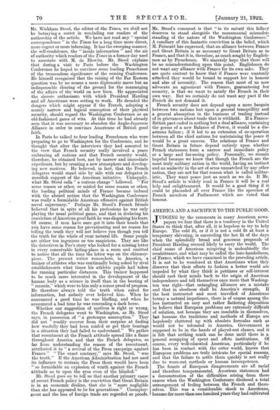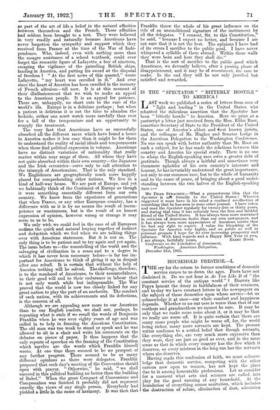AMERICA AND A SACRIFICE TO THE PUBLIC GOOD.
JUDGING by the comments in many American news- papers we fear that there is a tendency in the United States to think that, after all, it is hopeless to try to help Europe. The cold fit, or if it is not a cold. fit at least a temporary shivering, is succeeding the hot fit of the days when the splendidly broad and generous proposals of President Harding seemed likely to carry the world. The chief cause of American misgiving is undoubtedly the recalcitrance, and what may be called the lone-handedness, of France, which we have examined in the preceding article. It is not to be wondered at that Americans when theY discover that their efforts to fashion a better world are impeded by what they think is pettiness or self-interest should cast their minds back to the origin of American independence and tell themselves once more that Washing- ton was right—that entangling alliances are a mistake and that in aloofness shall be America's strength. If the best instructed and most travelled of Americans betray a natural impatience, there is of course among the less instructed an easy and rather flattering disposition to believe that European problems are extremely difficult of solution, not because they are insoluble in themselves, but because the traditions and methods of Europe are hopelessly cluttered up with obsolete formulas such as would not be tolerated in America. Government is supposed to be in the hands of played-out classes, and it is felt that nothing much can be done until there is a general scrapping of spent and effete institutions. Of course, every well,educated American, particularly if he has been in contact with the outer world, knows that European problems are truly intricate for special reasons, and that the failure to settle them quickly is not really due to worn-out, methods or human incompetence.
The founts of European disagreements are all racial and therefore temperamental. American statesmen had a demonstration of the difficulties arising from these causes when the Washington Conference disclosed a total estrangement of feeling between the French and them- selves. This was a considerable shook to Americans, because for more than one hundred years they had cultivated as part of the art of life a belief in the natural affinities between themselves and the French. These affinities had seldom been brought to a test. They were believed in very readily and naturally because Americans have never forgotten the sympathy and support which they received from France at the time of the War of Inde- pendence. Who, indeed, even with nothing more than the meagre assistance of a school textbook, could ever forget the romantic figure of Lafayette, a boy of nineteen, escaping the vigilance of the patrolling British ships, landing in America, and putting his sword at the disposal of freedom ? " At the first news of this quarrel," wrote Lafayette, " my heart was enrolled in it." And ever since the heart of America has been enrolled in the memory of French altruism—till now. It is at this moment of their disillusionment that we wish to make an appeal o the American people. It is an appeal for patience. There are, unhappily, no short cuts to the cure of the world's ills. Europe is in a delirium perhaps ; but when a patient is delirious it is not the time to abandon the bedside, rather one must watch more carefully than ever for a fall of the temperature and an opportunity to reapply the treatment.
The very fact that Americans have so successfully absorbed all the different races which have found a home in America makes it less easy than it might be for them to understand the reality of racial ideals and temperaments when these find political expression in volume. Americans have no distinct variations of nationality that really matter within near range of them. All whom they have not quite absorbed within their own country—the Japanese and the Irish eccentrics—serve only to call attention to the triumph of Americanism. That is the only standard. We Englishmen are geographically much more happily placed for comprehending other nations. We live in a kind of half-way house. We are part of Europe, and yet we habitually think of the Continent of Europe as though it were something essentially different from our own country. We know from the experience of generations that when France, or any other European country, has a difference with us it is by no means the result of incom- petence or wantonness, but is the result of an honest expression of opinion, however wrong or strange it may seem to us to be.
We only wish we could feel in the case of all European nations the quick and natural leaping together of instinct and deduction which we feel when we are talking things over with American statesmen. But it is not so. The only thing is to be patient and to try again and yet again. The issue before us—the remodelling of the .world and the salvaging of civilization in a sense and to a degree in which it has never been necessary before—is far too im- portant for Americans to think of giving it up in despair after one rebuff. It is certain that without the help of America nothing -will be solved. The challenge, therefore, is to the manhood of Americans, to their resourcefulnees, to their good will and to their endurance in labour that is not only worth while but indispensable. The War proved that the world is now too closely linked for any great nation to play the part of an anchorite. The conduct of each nation, with its achievements and its defections, is the concern of all.
Although we are appealing now more to our American than to our English readers, we shall not, perhaps, be repeating what is stale if we recall the words of Benjamin Franklin when he was over eighty years of age and was called in to help in framing the American Constitution. The old man was too weak to stand or speak and he was allowed to sit in a chair and write his comments on the debates on pieces of paper. It thus happens that the only reports of speeches on the framing of the Constitution which survive are the words which Franklin himself wrote. At one time there seemed to be no prospect of any further progress. There seemed to be as many different opinions as there were delegates. Franklin proposed that each day's meeting of the Convention should open with prayer, Otherwise," he said, " we shall succeed in this ..litical building no better than the building of Babel." " en the great Compact of Concessions and Compromises was finished it probably did not represent exactly the yiews of any single person. Everybody had yielded a little in the cause of harmony. It was then that Franklin threw the whole of his great influence on the side of an unconditional signature of the instrument by all the delegates. " I consent, sir, to this Constitution, he said, " because I expect no better, and because I am not sure that it is not the best. The opinions I have had of its errors I sacrifice to the public good. I have never whispered a syllable of them abroad. Within these walls they were born and here they shall die." That is the sort of sacrifice to the public good which Americans, we devoutly believe, after a passing phase of disappointment, and it may be of resentment, are sure to make. In the end they will be not only justified but satisfied and rewarded.



































 Previous page
Previous page